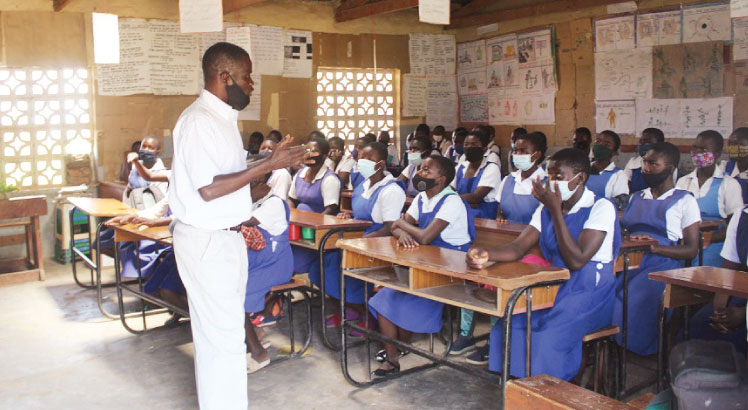Bleak options for 2019
It has been three years now and Peter Mutharika can hardly be called a success. But then we all knew it, didn’t we?
Coming into the 2014 election, the pensive were aware that not once in his years as a Cabinet minister in the government of his brother Bingu wa Mutharika had he shown any spark of leadership.

APM’s disappearing act
His style to facing problems was to close his eyes and hope that they go away or simply run away as he did during the University of Malawi (Unima) Academic Freedom struggle in 2011.
He has carried that management style into the presidency; ignore the problem, pretend it does not exist and hope that it disappears.
Nothing, it seems, is going to change that style. Malawians, instead, are going to have to be the ones to change things.
But whom do they turn to?
Chilima in the wings?
Those hoping for Vice-President Saulosi Chilima will be disappointed.
The man does not seem to have the gall or the strategy to start putting plausible distance between himself and the bungling of his boss in readiness for 2019.
Chilima has had plenty of opportunities to do so. Maizegate was one such. Rather, he has chosen to be silent, but silence, even he must know, is not a winning formula. It is confusing and infuriating to anyone who might want to support him.
Maybe he fears-as Patricia Kaliati came to find to her horror—that once you cross the ruling Democratic Progressive Party (DPP) inner circle, you have burnt your bridges.
But the most fascinating thing about this, though, is that Chilima is clearly sidelined and rendered redundant by his boss. He is an outsider vice-president with nothing meaningful to do, so, what does he have to lose?
Gone to bed with DPP
United Democratic Front (UDF) president Atupele Muluzi is a lamentable case of what might have been.
There is no denying that he has eaten into his own political capital by his association with the DPP.
The genesis and benefits of that association have been questioned by many in the UDF, including its own increasingly critically vocal member of Parliament Lucius Banda.
Atupele’s 2014 campaign and ‘agenda for change’ were heralded with much excitement because they were precisely the sort of campaign this generation needed—issues-based, futuristic, clean in substance and form, a mixture of youthful exuberance and steady experience.
Throughout, Atupele came across as almost presidential. Granted, 2014 was not his time, but 2019 could have been his fair shot.
But he cannot now come out and start shouting “Agenda for Change!” or “Dzuka, Malawi Dzuka!” and expect to be taken seriously.
Three years ago, that mantra fired up an excitable base, and had one foreign diplomat tell me: “This man will go on to greater things if he keeps this critical mass of supporters engaged and believing.”
Well, three years is too long a time in politics.
Today, Atupele’s critical mass is decimated, confused and disillusioned, thanks to his flirtations with Peter Mutharika’s government.
Then you have Reverend Lazarus Chakwera and his Malawi Congress Party (MCP).
MCP and the war within
Some say the internecine war going on in MCP right now is a wonderful thing for intra-party democracy.
Maybe it is.
But is anyone thinking about what damage all this is causing the party going into a crucial electoral year?
The other shocker is Chakwera himself. Unless he begins to embrace all of Malawi, and not think that only votes of the Central Region will carry him into State House, MCP has no hope.
I often wonder whether Chakwera—a man used to the sanctimonious praise and worship of religion—can withstand the rigors of robust political activism.
I am still not convinced.
Another problem with Chakwera thus far is that he has articulated no clear policies.
He has failed to take advantage of Mutharika’s blundering to position himself as a viable alternative, and is now garnering a reputation as being a person who can’t take criticism.
His style is to alienate those—like Gustav Kaliwo and Jessie Kabwila—with a contrary opinion and surround himself with zealots.
PP’s runaway leader
And there is Joyce Banda’s Peoples Party (PP), which right now is a sorry state of affairs.
Until the country’s first female president returns to galvanise her party, PP will continue to be rudderless and bleed membership. Uladi Mussa is the acting president, but everyone knows that while Mussa is passionate and brave and belligerent, he is not smart enough to be anyone’s president.
The year 2019 is going to be a delicate moment, which will require Malawians to look beyond the traditional lines of voting—ethnic and regional—and worry about the overall health of the country itself.
Today, we are looking at a tattered economy, tattered public institutions and leadership.
It will get worse.
No doubt, some people are doing well, materially, in this country, amidst all the suffering. But a good number of those benefitting from this state of decay are the crooked, the ruthless and the utterly corrupt. The law will not touch them because they belong to the correct hue of the colour blue.
That so far nobody has been hauled before the courts of law for Maizegate is indicative of the erosion and decay of principles and values at the altar of political expediency, cronyism and friendship.
The same reckless way of doing things will be transported to 2019 and beyond. The country will continue to crumble. Unless, of course, Malawians react to their poverty and mismanagement of their affairs in a way that ushers in a bold new leadership, not one led by over-the-hill politicians who have become intoxicated with the kachasu of materialism, corruption, indifference, ineptitude, and cronyism.





